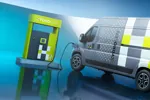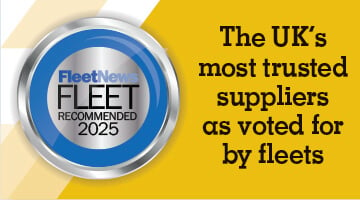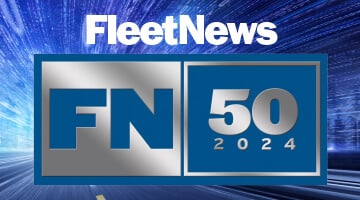Back in 2003, the Leasedrive Velo senior team made an ambitious and outspoken claim during an interview with Fleet News: “we will re-write the rules of fleet management”.
Roger Partridge, David Bird and Roddy Graham had recently acquired the business via a buy-in management buy out.
They felt that companies were being poorly serviced by the existing crop of contract hire providers.
“We wanted to do something different – we believed there was a niche for a company delivering great customer service,” says managing director David Bird.
Investment was made in three key areas: people, systems and infrastructure.
Leasedrive Velo also took the unusual step of insisting on sole supply with all its customers – it didn’t want to share with its rivals.
That way it could establish a stronger and closer relationship, more of a partnership.
And those customers had to be blue chip with a significant fleet, typically 100-1,000 vehicles.
So, first question: does the team feel it has succeeded in re-writing the rules?
“We’ve made our competitors sit up and take notice. We forced them to take a very hard look at how they delivered their service to the sector,” says Bird.
“Most people didn’t think we’d succeed; it was unusual for organisations like us to be fussy about who we dealt with and how. We can sit back now in 2010 and say ‘we proved you wrong’.”
He adds: “We have now seen a lot of the bigger players start to retrench back into blue chip and sole supply.
"They are copying our model, so yes, we believe we have changed the rules.”
Leasedrive Velo’s selective approach to tendering could easily have back-fired. However, its growth and customer retention rate backs its belief that plenty of companies value service above all else.
“We are in the compensation and benefits industry and our service delivery is aimed at companies that recognise the value of people and the fact that their car is the largest value and most emotive to them,” says commercial director Roddy Graham.
“Because the car is so important to their staff, they need the right partner to look after them.”
He points to lots of little things that make Leasedrive Velo stand out.
“For example, one of our customers has a lot of Korean drivers so we recorded a voice message in Korean if they are in an accident. That makes a huge difference to them.”
The group also has some customers that have their own funding.
It takes a tripartite approach, sourcing the vehicle and then securing the funding from the customer’s source. “That’s unique to us,” claims Graham.
A recent restructure has seen chief executive officer Roger Partridge take a back seat role as non-executive director.
Former BT Fleet finance and commercial director Robert Whitrow has been brought in as chief financial officer with the specific aim of driving forward the growth strategy, which includes acquisition.
He believes the leasing sector is set for an upheaval this year with several companies “hanging on by their fingernails”.
“There’s a number that have scrambled through the economic downturn with a view to getting to the other side. But now they will look to get out,” Whitrow says.
“We are acquisitive and will make some acquisitions this year.
“Our business model is very scaleable – we could quadruple the size of the business on the number of vehicles without affecting our focus.”
Leasedrive Velo weathered the recessionary storm last year relatively unscathed with profits equalling 2008.
Customers who had stopped replacing vehicles are now coming back to the market.
Many extended contracts from three years to four; Bird expects them to stick with the longer contract.
“Four years/80,000 miles will be the average for the industry,” he says, “although we have some customers who are offering the opportunity for employees who trade down to a smaller, lower CO2 vehicle to change at three years instead of four.”
Its growth will not be all about acquisition; the prospect pipeline is strong, helped by the company’s acceptance on to the local authority framework agreement at the end of last year.
“We are also seeing upturns in the recruitment market and that will affect the way companies look at cars,” Whitrow says.
“And there are issues with bank-owned contract hire companies who are making cuts because it is not their core business. That will affect their customer service.”
Before the recession, Leasedrive Velo was signing up one fleet a month; it expects to return to that growth rate later this year.
The group also reports a rise in its rental division, which contributes half of its profits via more than 1,000 customers, though not necessarily sole supply.
In March it had the highest number of rental days since November 2008.
The bulk of its business is short-term hire, below 28 days, where it offers free unlimited mileage, free delivery and collection (including out of hours) and free one-way rentals.
For longer rentals, Leasedrive Velo offers Stopgap Mid-term rental and for rentals of more than 90 days it has Stopgap Plus.
New products to be launched this year in its leasing division include P11D:Manager, which enables fleets to communicate the P11D statement electronicallyto staff before it is submitted to HMRC, and GreyFleet:Manager, which is in its final testing phase and will help fleets to carry out duty of care checks and request scans of key driver/car documents.
Leasedrive Velo has seen companies encourage grey drivers back into the fleet to enable them to better control their duty of care responsibilities.
But while that will inevitably result in larger fleet sizes, the group is also seeing more companies outsourcing the fleet function.
Graham, in addition to his Leasedrive Velo role, is chairman at fleet training and education organisation Institute of Car Fleet Management.
He is seeing the fleet management role shrink within many companies as they outsource the function – and that fits well with Leasedrive Velo because it feels it can add greater value.
“The day of the 100% fleet manager is being phased out because there are so many support companies out there,” Graham says.
But, he adds: “We are still encouraging people to have training with ICFM even if the fleet is part of their role.
"We need to encourage more professionalism, whether it is a finance director or HR director – fleet management is still important.”
Salary sacrifice could be next big growth area
Salary sacrifice could be the next big growth area, according to Leasedrive Velo.
The company has had a product for five years and believes the taxation focus on low CO2 cars is opening up greater opportunities.
And while affinity schemes never worked because dealers could offer staff a better deal
on cars, salary sacrifice is a “fantastically tax-efficient method of delivering a benefit”, says Roddy Graham.
He forecasts that some employers will replace their perk schemes with salary sacrifice, while even essential user fleets could benefit as long as they have clear policy guidelines to eliminate any risk over early terminations.
“With the number of cars available that are sub-120g/km – more than 600 – there’s a huge opportunity,” Graham adds.
“The Government has linked the environmental focus to tax savings and that fits in with salary sacrifice, especially with manufacturers developing low emission cars that are aspirational.
"And employers save on national insurance, insurance and fuel costs which reduces wholelife costs.”
Leasedrive Velo is considering white labelling its salary sacrifice scheme with a partner that does payroll for them to offer it to their customers. It believes they could be the right fulfilment partners.
Investment in core areas key to growth
Leasedrive Velo has invested millions in three core areas since its MBO in 2003: people, systems and infrastructure.
It was the first to embrace web-enabled technology as an end-to-end solution – from quote to order to support and delivery with no re-keying required.
“It meant a fleet could manage the administration themselves,” says Roddy Graham.
The company also invested heavily in its people, moving them around departments to give them greater expertise.
Staff are encouraged to “weave into the corporate structure” of their clients, according to Graham.
“They go through staff induction programmes for new customers to get under their skin,” he adds. “We try not to have an off-the-shelf product.”
The three company directors act as account sponsors for each customer (“we re-wrote the rules on account management,” says Graham), attending quarterly review meetings with the account manager. It’s about being visible to the customer and ensures speedy action on decisions.
“A quick no is better than a long maybe,” Graham says.
“The answer’s usually yes, but if it’s no it will be given immediately.”


















Login to comment
Comments
No comments have been made yet.